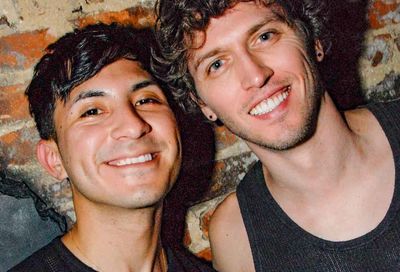Ruby Corado Released on Home Arrest While Awaiting Trial
Judge releases the former Casa Ruby head, who is facing fraud and money laundering charges, on "personal recognizance."

Ruby Corado, the embattled former executive director of the now-defunct Casa Ruby, was released from jail and placed under home arrest as she awaits trial on fraud and money laundering charges.
Corado, 53, will be confined to the home of her niece in Rockville, Md., except for legal or medical appointments.
She is being released on personal recognizance without having to post bail. However, she will be subject to GPS monitoring, barred from accessing her passport, visiting El Salvador, or any consulate office of El Salvador.
Corado was arrested on March 5 at a hotel in Laurel, Md., and charged with bank fraud, wire fraud, money laundering, illegal monetary transactions, and failure to file a report of a foreign bank account.
She allegedly diverted $150,000 of Casa Ruby’s pandemic relief funds to personal bank accounts in El Salvador under her birth name, which was hidden from the IRS.
Corado has been held at the D.C. jail since her arrest. She has not formally entered a plea to the charges against her but is expected to when she next appears in court on Friday, April 12.
As reported by The Washington Post, Corado’s release was a point of contention in two hearings, the first of which took place on March 8, and the second on March 12.
Federal prosecutors argued that Corado was a possible flight risk, arguing that she had fled the United States previously after coming under scrutiny for alleged financial mismanagement.
“Although the defendant was once a leading charitable figure in our community, she betrayed the trust of donors who supported her, the District, and federal government that funded her, and the very community she claimed to serve,” Assistant U.S. Attorney John Borchert wrote in a motion requesting that Corado be held without bond.
“When coupled with the fact that the defendant abandoned her career, sold her home, and fled the country after learning she might be prosecuted for this financial misconduct, there are simply no conditions or combination of conditions that can assure the defendant’s return to court.”
Corado’s public defender, Diane Shrewsbury, argued that Corado’s move to El Salvador was not an attempt to avoid prosecution but was part of a longer-term plan to open an international branch of Casa Ruby in the country where Corado was born and lived until age sixteen. When that project failed, Corado returned to the United States looking for work and planning to stay.
Shrewsbury claimed that Corado was in the process of starting a new job as an assistant, and plans to ask her new employer if she can work remotely while under house arrest.
Shrewsbury also argued that Corado’s stay in custody has been distressing, as she was placed in solitary confinement within a men’s unit of the D.C. jail.
The jail began housing transgender inmates based on their personal preferences following a class-action lawsuit in 2021. But according to the Post, a spokesperson for the jail claimed Corado had indicated a preference to be housed in a male unit, and was placed in solitary confinement for her own protection.
Shrewsbury also argued that Corado, a legal permanent resident who has lived in the United States for 35 years, has strong ties to the D.C. area, where her father and sisters live, where her husband was raised, and where his family also lives.
Her husband, David Walker, is a U.S. citizen and is currently in the process of returning from El Salvador, according to Corado’s lawyer.
Shrewsbury argued her client, as a first-time offender facing nonviolent charges, would likely not serve significant jail time even if convicted, likely spending more time in pretrial detention than she would after a conviction — making it all the less likely that Corado would pose a flight risk.
U.S. Magistrate Judge Robin Meriweather said she was not comfortable releasing Corado without some restrictions, noting that the government has “substantial evidence to corroborate” the fraud charges, and taking into account prosecutors’ arguments that an extradition treaty from 1911 between the United States and El Salvador does not cover financial crimes.
However, Meriweather rejected prosecutors’ demands that Corado be held without bond, saying she was comfortable placing Corado under surveillance in the custody of a niece who primarily works from home and who promised to alert the court “right away” if her aunt goes missing.
“It’s a mixed situation,” Meriweather said, adding that “the positives outweigh the negatives” when determining whether to release Corado as she awaits trial.
Corado stepped down as Casa Ruby’s executive director in 2021 after a grant from the D.C. Department of Human Services for nearly $840,000 was not renewed, placing Casa Ruby’s transitional and low-barrier shelter housing at risk and forcing the organization to seek financial support in the form of donations.
The following year, Casa Ruby shut its doors and scuttled all of its housing programs for LGBTQ youth and immigrants after several employees alleged they had not been paid for past work and multiple landlords complained that rent had not been paid for properties where Casa Ruby clients were being housed. The D.C. Attorney General’s office asked a D.C. Superior Court judge to freeze Casa Ruby’s bank accounts to prevent Corado — who still retained control over them, even after her resignation — from withdrawing further funds.
Then-Attorney General Karl Racine filed a lawsuit against Corado later that year, accusing her of diverting hundreds of thousands of dollars in District of Columbia grant money into her personal bank accounts, paying workers less than minimum wage, and failing to compensate workers for the work they’d done. That lawsuit remains ongoing.
The Wanda Alston Foundation, another nonprofit that works with LGBTQ homeless youth, which was appointed as the receiver for Casa Ruby following its closure, recommended dissolving Casa Ruby, finding its financial debts far exceeded its assets.
The Wanda Alston Foundation has also sued Casa Ruby’s board, alleging that the lack of oversight from board members enabled Corado to embezzle more than $800,000 in total, increase her own personal salary, and open an office in El Salvador without seeking permission from the board.
Support Metro Weekly’s Journalism
These are challenging times for news organizations. And yet it’s crucial we stay active and provide vital resources and information to both our local readers and the world. So won’t you please take a moment and consider supporting Metro Weekly with a membership? For as little as $5 a month, you can help ensure Metro Weekly magazine and MetroWeekly.com remain free, viable resources as we provide the best, most diverse, culturally-resonant LGBTQ coverage in both the D.C. region and around the world. Memberships come with exclusive perks and discounts, your own personal digital delivery of each week’s magazine (and an archive), access to our Member's Lounge when it launches this fall, and exclusive members-only items like Metro Weekly Membership Mugs and Tote Bags! Check out all our membership levels here and please join us today!
























